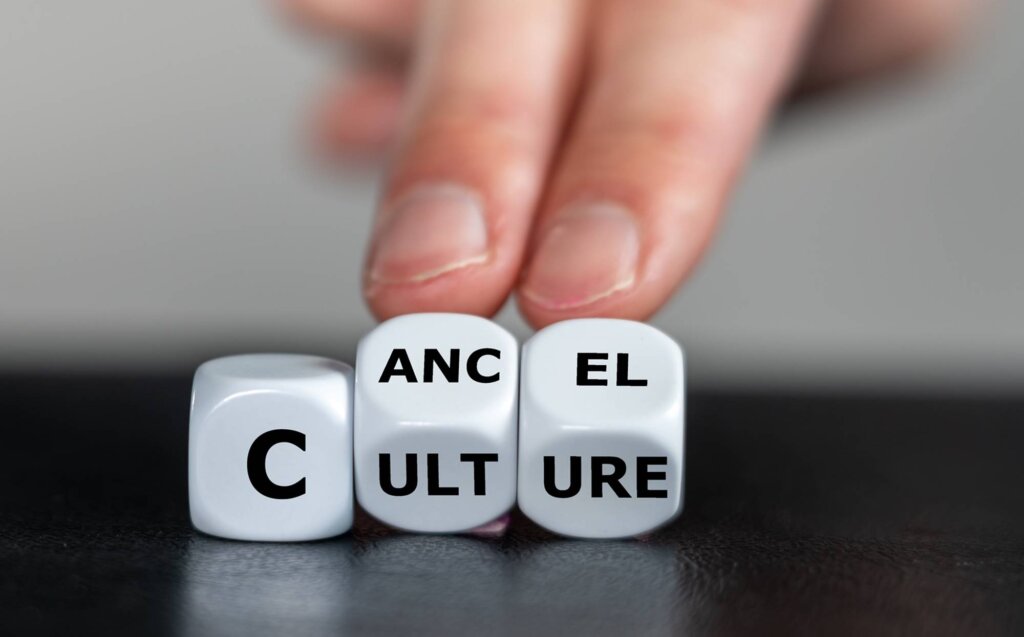Cancel Culture on Social Media


Written and verified by the psychologist Valeria Sabater
Cancel culture on social media alludes to a phenomenon that brings together both supporters and detractors. It refers to the increasingly common practice of removing the status or withdrawing support from people online, due to their offensive or alternative behaviors or comments. However, public criticism isn’t new. But, what is comparitively new, is for it to be done anonymously, yet possess such great potential and influence.
For example, figures such as the British comedian, Maureen Lipman, are afraid to do certain types of humor for fear of being canceled. Whoever is canceled doesn’t just cease to exist on social media. In addition, they suffer the attack all over the digital universe where words are shared millions of times over. But, what’s the origin of this phenomenon? And, what feeds it and why does it gain so many followers? Let’s find out.
Social media has done nothing more than facilitate a phenomenon that’s always existed. Now, it’s easier than ever to veto (unsubscribe) someone as soon as we believe their behavior to be unethical or we simply don’t share their views.

Cancel culture on social media
Celebrities, companies, big brands, and even ordinary individuals; anyone can suffer from it. Cancel culture on social media consists of punishing and withdrawing the visibility of figures whose behaviors are frowned upon in the social sphere. Sometimes, they don’t even have to have committed a crime.
In fact, it’s enough for a group to identify an individual’s action as unethical or as them having an opinion that deviates from the majority. Although the act of making invisible or making a vacuum of the wayward, immoral, or transgressive individual has always existed, the world of social media has multiplied the consequences. In fact, most cancellations are generated when a comment or news item goes viral.
Although this practice can help to make certain injustices visible (such as harassment, abuse, or discrimination), there’s a nuance. This is the fact that often, an excess of sensitivity prevails and every comment is over-processed, without taking into account that the judgment might be distorted by a partial interpretation or reply out of context.
To cancel means to remove a presence and investment in someone. It means ostracizing them as a result of allegedly offensive behavior for the majority of users of social media.
Its origin and increase
In the first decade of the 2000s, the South Park program ironically tried to get their own show canceled by using the hashtag #CancelSouthPark. In reality, we’ve been hearing this term for so long that we now have the feeling that it was always part of our social reality.
Moreover, adolescents have normalized this phenomenon and it’s now a part of their daily lives. A study conducted by the University of Utrecht (Netherlands) highlights how young people between the ages of 18 and 25 dictate that certain figures become digitally ostracised, as has happened to J. K Rowling, Ellen Degeneres, James Gunn, and Kanye West. But, how did it all start?
1. The term cancel and its misogynistic root
Curiously, the term cancel as a synonym for erasing or making someone disappear originates from a Wesley Snipes film, New Jack City, 1991. In it, the protagonist insults, with the aim of ‘canceling’, a woman he considered to be useless. Later, this expression was used again in Love and Hip-Hop, a television show.
2. Culture of denunciation, the real purpose
Cancel culture arose with a clear purpose: to denounce what was unfair. Although boycotting or making someone’s status invisible for their conduct isn’t new, the digital world has made it easier and encouraged the process. For instance, in 2014, activist Sue Park wrote #cancelColbert. She was calling for comedian Stephen Colbert to be canceled over an apparently racist comment he made about Asians.
However, the real rise of the cancel culture phenomenon came with the advent of the #MeToo movement in 2017. Its objective was to denounce the experiences of harassment and social aggression suffered by women. It was triggered by putting into the public arena the encounters of dozens of actresses with the film producer, Harvey Weinstein.
Cancel culture is an instrument for punishing well-known or powerful people for behaviors that we find reprehensible.
3. Seeking responsibility for offensive conduct
In 2019, cancel culture evolved, from denunciation to the search for responsibility and the employment of a type of digital justice. That of harassment, devaluation, and public ostracism. Indeed, offensive behaviors are vilified and sanctioned on social media.
Therefore, anything that’s interpreted as politically or morally incorrect is transferred to the social media universe for punishment. The masses, the users of Twitter, for example, become judges and executioners and snatch the status, public image, and even job future of the individual who commits an offensive act.
Zhejiang University (China) analyzed this phenomenon. It states that Twitter acts as an instrument of social justice, capable of inciting layoffs and boycotts toward organizations, companies, and even countries.

What does cancel culture achieve?
Canceling someone is a way of acknowledging that, while we can’t change structural inequality or injustices, we can speak out and punish them. And, social media is the best scenario, the most suitable instrument, and, often, the most dangerous. Indeed, the implication that this phenomenon can have can’t be ignored.
We live in a society where participation and contribution are easy. You only have to open an account to start commenting, sharing, and awarding likes. This can have positive consequences, but it also makes cancel culture a growing phenomenon. Every day someone new is made invisible and there are many who are afraid to express themselves for fear of said punishment. So, what does this trend achieve?
- It’s a tool of power. It can elevate someone, but also turn them into a villain.
- Canceling is, for many people, a corrective mechanism when they feel impotent due to certain injustices.
- While cancel culture seeks to hold people accountable for their actions, the results can be dire. Added to job losses are mental health problems and even suicides.
- This phenomenon conditions freedom of expression. It homogenizes thoughts and there’s a loss of logical richness. Fear arises when it comes to giving an opinion or making a joke…fear of transgressing in a direction that’s not politically correct.
Cancel culture and prudence
There’s one obvious fact. Inappropriate behavior and unethical characters abound in our society. Injustices occur daily and social media is an exceptional channel for reporting them. However, while it makes it possible for the canceled to reap what they sow, it’s also advisable that we’re prudent.
In fact, there’s a bottom line that we must consider. In the game of cancel culture, any one of us could, at some point, be the straw figure being burned on the public pyre. And, there’s no worse experience than humiliation and shame in the digital universe. So, let’s make sure we consider our behavior on social media and any figures we choose to cancel. For example, just because someone thinks differently doesn’t mean they deserve to be ostracised. It’s well worth thinking about.
Cancel culture on social media alludes to a phenomenon that brings together both supporters and detractors. It refers to the increasingly common practice of removing the status or withdrawing support from people online, due to their offensive or alternative behaviors or comments. However, public criticism isn’t new. But, what is comparitively new, is for it to be done anonymously, yet possess such great potential and influence.
For example, figures such as the British comedian, Maureen Lipman, are afraid to do certain types of humor for fear of being canceled. Whoever is canceled doesn’t just cease to exist on social media. In addition, they suffer the attack all over the digital universe where words are shared millions of times over. But, what’s the origin of this phenomenon? And, what feeds it and why does it gain so many followers? Let’s find out.
Social media has done nothing more than facilitate a phenomenon that’s always existed. Now, it’s easier than ever to veto (unsubscribe) someone as soon as we believe their behavior to be unethical or we simply don’t share their views.

Cancel culture on social media
Celebrities, companies, big brands, and even ordinary individuals; anyone can suffer from it. Cancel culture on social media consists of punishing and withdrawing the visibility of figures whose behaviors are frowned upon in the social sphere. Sometimes, they don’t even have to have committed a crime.
In fact, it’s enough for a group to identify an individual’s action as unethical or as them having an opinion that deviates from the majority. Although the act of making invisible or making a vacuum of the wayward, immoral, or transgressive individual has always existed, the world of social media has multiplied the consequences. In fact, most cancellations are generated when a comment or news item goes viral.
Although this practice can help to make certain injustices visible (such as harassment, abuse, or discrimination), there’s a nuance. This is the fact that often, an excess of sensitivity prevails and every comment is over-processed, without taking into account that the judgment might be distorted by a partial interpretation or reply out of context.
To cancel means to remove a presence and investment in someone. It means ostracizing them as a result of allegedly offensive behavior for the majority of users of social media.
Its origin and increase
In the first decade of the 2000s, the South Park program ironically tried to get their own show canceled by using the hashtag #CancelSouthPark. In reality, we’ve been hearing this term for so long that we now have the feeling that it was always part of our social reality.
Moreover, adolescents have normalized this phenomenon and it’s now a part of their daily lives. A study conducted by the University of Utrecht (Netherlands) highlights how young people between the ages of 18 and 25 dictate that certain figures become digitally ostracised, as has happened to J. K Rowling, Ellen Degeneres, James Gunn, and Kanye West. But, how did it all start?
1. The term cancel and its misogynistic root
Curiously, the term cancel as a synonym for erasing or making someone disappear originates from a Wesley Snipes film, New Jack City, 1991. In it, the protagonist insults, with the aim of ‘canceling’, a woman he considered to be useless. Later, this expression was used again in Love and Hip-Hop, a television show.
2. Culture of denunciation, the real purpose
Cancel culture arose with a clear purpose: to denounce what was unfair. Although boycotting or making someone’s status invisible for their conduct isn’t new, the digital world has made it easier and encouraged the process. For instance, in 2014, activist Sue Park wrote #cancelColbert. She was calling for comedian Stephen Colbert to be canceled over an apparently racist comment he made about Asians.
However, the real rise of the cancel culture phenomenon came with the advent of the #MeToo movement in 2017. Its objective was to denounce the experiences of harassment and social aggression suffered by women. It was triggered by putting into the public arena the encounters of dozens of actresses with the film producer, Harvey Weinstein.
Cancel culture is an instrument for punishing well-known or powerful people for behaviors that we find reprehensible.
3. Seeking responsibility for offensive conduct
In 2019, cancel culture evolved, from denunciation to the search for responsibility and the employment of a type of digital justice. That of harassment, devaluation, and public ostracism. Indeed, offensive behaviors are vilified and sanctioned on social media.
Therefore, anything that’s interpreted as politically or morally incorrect is transferred to the social media universe for punishment. The masses, the users of Twitter, for example, become judges and executioners and snatch the status, public image, and even job future of the individual who commits an offensive act.
Zhejiang University (China) analyzed this phenomenon. It states that Twitter acts as an instrument of social justice, capable of inciting layoffs and boycotts toward organizations, companies, and even countries.

What does cancel culture achieve?
Canceling someone is a way of acknowledging that, while we can’t change structural inequality or injustices, we can speak out and punish them. And, social media is the best scenario, the most suitable instrument, and, often, the most dangerous. Indeed, the implication that this phenomenon can have can’t be ignored.
We live in a society where participation and contribution are easy. You only have to open an account to start commenting, sharing, and awarding likes. This can have positive consequences, but it also makes cancel culture a growing phenomenon. Every day someone new is made invisible and there are many who are afraid to express themselves for fear of said punishment. So, what does this trend achieve?
- It’s a tool of power. It can elevate someone, but also turn them into a villain.
- Canceling is, for many people, a corrective mechanism when they feel impotent due to certain injustices.
- While cancel culture seeks to hold people accountable for their actions, the results can be dire. Added to job losses are mental health problems and even suicides.
- This phenomenon conditions freedom of expression. It homogenizes thoughts and there’s a loss of logical richness. Fear arises when it comes to giving an opinion or making a joke…fear of transgressing in a direction that’s not politically correct.
Cancel culture and prudence
There’s one obvious fact. Inappropriate behavior and unethical characters abound in our society. Injustices occur daily and social media is an exceptional channel for reporting them. However, while it makes it possible for the canceled to reap what they sow, it’s also advisable that we’re prudent.
In fact, there’s a bottom line that we must consider. In the game of cancel culture, any one of us could, at some point, be the straw figure being burned on the public pyre. And, there’s no worse experience than humiliation and shame in the digital universe. So, let’s make sure we consider our behavior on social media and any figures we choose to cancel. For example, just because someone thinks differently doesn’t mean they deserve to be ostracised. It’s well worth thinking about.
All cited sources were thoroughly reviewed by our team to ensure their quality, reliability, currency, and validity. The bibliography of this article was considered reliable and of academic or scientific accuracy.
- Bouvier, Gwen. (2020). Racist call-outs and cancel culture on Twitter: The limitations of the platform’s ability to define issues of social justice. Discourse, Context & Media, 38, 100431. https://www.sciencedirect.com/science/article/abs/pii/S2211695820300647
- Clark, Meredith D. (2020). Drag Them: A brief etymology of so-called «cancel culture». Communication and the Public. SAGE Publications. 5 (3–4), 88–92. https://journals.sagepub.com/doi/10.1177/2057047320961562
- Kermans, L. (2022). Canceling Cancel Culture [tesis de grando, Universidad de Utrecht]. Repositorio de Tesis UU. https://studenttheses.uu.nl/handle/20.500.12932/42138
- Norris, Pippa (2020). Closed Minds? Is a ‘Cancel Culture’ Stifling Academic Freedom and Intellectual Debate in Political Science? HKS Working Paper, RWP20-025. https://papers.ssrn.com/sol3/papers.cfm?abstract_id=3671026
This text is provided for informational purposes only and does not replace consultation with a professional. If in doubt, consult your specialist.







